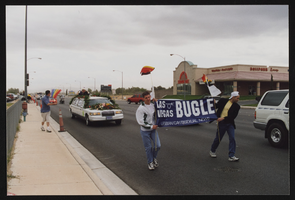Search the Special Collections and Archives Portal
Search Results
Leona Hinton oral history interviews
Identifier
Abstract
Oral history interviews with Leona Hinton conducted by Irene Rostine on September 27, 1995, October 31, 1995, and November 18, 1995 for the Women's Research Institute of Nevada (WRIN). In her interviews Hinton discusses working for Rheem Manufacturing Company in Henderson, Nevada during World War II. She describes the challenges of being a working mother, the housing issues in Henderson, and attending Mormon church services. Hinton also discusses her husband's military and firefighter career. Finally, she describes wages, working conditions, and specifics about her work at the Rheem Manufacturing plant.
Archival Collection
Thelma Turner oral history interview
Identifier
Abstract
Oral history interview with Thelma Turner conducted by Claytee D. White on October 21, 2004 for the African Americans in Las Vegas: a Collaborative Oral History Project. In this interview, Turner discusses her family background and moving to Las Vegas, Nevada in 1947. She describes the city at the time and recalls her educational experiences while attending the Fifth Street School and Las Vegas High School. Turner then talks about her involvement as a teacher for Sunday church school and her employment at the Moulin Rouge Hotel-Casino as a change girl and waitress. Later, Turner discusses the Helldorado Parade, racial integration, and being the first African American family to move to North Las Vegas in 1966. Lastly, Turner describes housing and what the community was like in the Westside.
Archival Collection
Jack K. Leavitt oral history interview
Identifier
Abstract
Oral history interview with Jack K. Leavitt conducted by Alick Dziabczenko on February 28, 1979 for the Ralph Roske Oral History Project on Early Las Vegas. In this interview, Leavitt describes his life as a child living in early Las Vegas, Nevada during the Great Depression. Leavitt also describes seeing President Franklin D. Roosevelt's speech at Hoover (Boulder) Dam, the plane crash that resulted in Carole Lombard's death, and the construction of Nellis Air Force Base. The reaction of Las Vegas, Nevada to the outbreak of World War II is discussed, but information is limited, as Leavitt explains he was deployed in North Africa and Italy during the majority of that period. Finally, Leavitt talks about his career as a real estate broker in Las Vegas, and how real estate has evolved in the city.
Archival Collection
Erika Castro oral history interview
Identifier
Abstract
Oral history interview with Erika Castro conducted by Maribel Estrada Calderon on November 12, 2018 for the Latinx Voices of Southern Nevada Oral History Project. In this interview, Castro discusses her early life in Mexico City, Mexico before migrating with her family to North Las Vegas, Nevada in 1992. She describes adapting to the city, her early education, and learning that she was an undocumented immigrant. Castro then talks about Deferred Action for Childhood Arrivals (DACA) and how DACA gave her a vision for a future for the first time. Later, Castro discusses The Development, Relief, and Education for Alien Minors (DREAM) Act and explains objectives of the nonprofit organization, Progressive Leadership Alliance of Nevada (PLAN). Lastly, Castro talks about her involvement with Planned Parenthood, studying social work at the University of Nevada, Las Vegas (UNLV), and immigration resources provided by the UNLV Law Clinic.
Archival Collection
Nanyu Tomiyasu oral history interview
Identifier
Abstract
Oral history interview with Nanyu Tomiyasu conducted by Andrew Russell on March 22, 1987. In this interview, Tomiyasu discusses his father's large-scale commercial farm in Las Vegas, Nevada and the amount of produce the farm produced through the 1920s. He expands on the impact of the 1922 railroad strike, particularly in regard to the Japanese population in the city. He recounts the general lack of discrimination and segregation against Japanese residents in Las Vegas, how Japanese families integrated with the community and how they maintained their cultural traditions. Later, he begins to discuss the impact of World War II on Japanese in the people living in the western states, Las Vegas' response to its Japanese residents, and how relocation and internment impacted families.
Archival Collection

Las Vegas Bugle float at the second annual Gay Pride parade, image 001: photographic print
Date
Archival Collection
Description
Image
Ken Hanlon oral history interview
Identifier
Abstract
Ken Hanlon oral history interview conducted by Cynthia Cicero on January 17, 2014 for the UNLV University Libraries Oral History Collection. In this interview, Hanlon discribes his background, talking about his childhood in Maryland, his early interest in music, and the opportunity to study with the same band teacher through middle and high school. He talks about starting to play a baritone horn before switching to the trombone, his early experiences playing with dance bands, starting private lessons, and eventually matriculating to the Peabody Conservatory of Music in Baltimore, Maryland. He continues, relating his five years teaching middle-school music after graduating from college, and his decision to move to Las Vegas, Nevada in 1968 to seek work as a full-time musician. After talking about some of the difficulties he faced finding work, he discusses his time in a road band and deciding to apply to teach at the University of Nevada, Las Vegas (UNLV). He explains that he was hired to teach as an adjunct in 1970 and two weeks later was offered the job of department chair, a role he held for 16 years before moving into university administration. During this period he continued to perform, playing trombone in the Sands Hotel and Casino house band under the direction of Antonio Morelli. Finally, he discusses Morelli at more length, and concludes by talking about endowments for music education and the Arnold Shaw music collection at the Arnold Shaw Center at UNLV.
Archival Collection
Leva Beckley oral history interviews
Identifier
Abstract
Oral history interviews with Leva Beckley conducted by Bernard Timberg of KLVX Channel 10 on January 20 and 31, 1974. In this interview, Buckley talks of moving to Las Vegas, Nevada with her husband in 1910, setting up her husband's clothing business at the Hotel Nevada, the construction of the family home at 120 South Fourth Street, and the birth of her two children. She discusses raising her children, the various amusements the community offered to young families, and her activities as a charter member of the Mesquite Club. She also responds to questions about changes in the culture of the city, particularly in regard to crime and illegal activities. Finally, she shares family photographs with the interviewer.
Archival Collection
Emmy Kasten oral history interview
Identifier
Abstract
Oral history interview with Emmy Kasten conducted by Kristel Peralta, Ayrton Yamaguchi, and Stefani Evans on March 17, 2021 for Reflections: The Las Vegas Asian American and Pacific Islander Oral History Project.
Emmy Kasten discusses her Filipino heritage, her family, and her previous employment working in various industries including acting and broadcasting, marketing, philanthropy, writing, and event production. Emmy shares how she and her husband and children moved to Las Vegas in 2016 after her parents moved to the city a decade earlier, and she discusses her current professional pursuits as a board member of the Miss Asian North America Organization (MANAO) and the Las Vegas Fashion Council.
Subjects discussed include: University of California, Irvine (UCI); KTLA Morning News; Red Bull Music Academy; Rock Star Gaming; Filipino foods; Vegas Magazine; and anti-Asian discrimination.
Archival Collection

Fred Goldberg oral history interview: transcript
Date
Archival Collection
Description
Oral history interview with Fred Goldberg conducted by Barbara Tabach on December 03, 2017 for the Remembering 1 October Oral History Project. In this interview, Fred Goldberg shares his experience of flying to Las Vegas, Nevada on October 1, 2017 while the mass shooting occurred on the Strip as well as his eventual arrival in Las Vegas. He describes the changes in travel after the shooting, including the plane's diverted course due to the McCarran airport lockdown and the enforced luggage check at his hotel in Las Vegas. Goldberg discusses his confusion regarding what had happened and his discovery of the tragic events that had occurred.
Text
